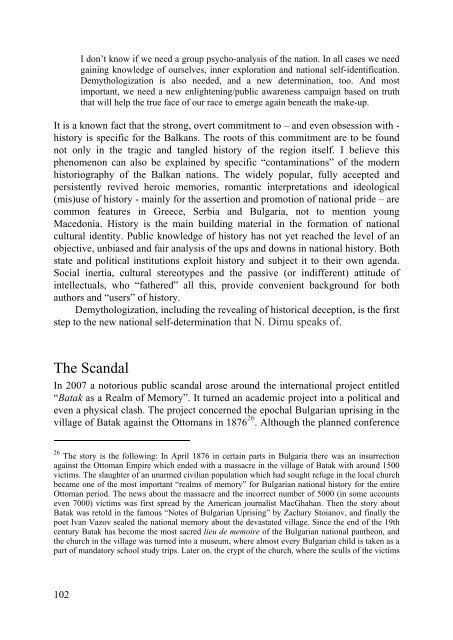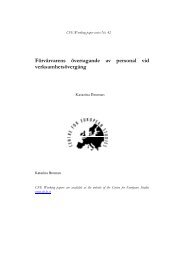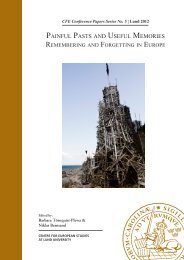MINNE OCH MANIPULATION - Centre for European Studies - Lunds ...
MINNE OCH MANIPULATION - Centre for European Studies - Lunds ...
MINNE OCH MANIPULATION - Centre for European Studies - Lunds ...
Create successful ePaper yourself
Turn your PDF publications into a flip-book with our unique Google optimized e-Paper software.
102<br />
I don’t know if we need a group psycho-analysis of the nation. In all cases we need<br />
gaining knowledge of ourselves, inner exploration and national self-identification.<br />
Demythologization is also needed, and a new determination, too. And most<br />
important, we need a new enlightening/public awareness campaign based on truth<br />
that will help the true face of our race to emerge again beneath the make-up.<br />
It is a known fact that the strong, overt commitment to – and even obsession with -<br />
history is specific <strong>for</strong> the Balkans. The roots of this commitment are to be found<br />
not only in the tragic and tangled history of the region itself. I believe this<br />
phenomenon can also be explained by specific “contaminations” of the modern<br />
historiography of the Balkan nations. The widely popular, fully accepted and<br />
persistently revived heroic memories, romantic interpretations and ideological<br />
(mis)use of history - mainly <strong>for</strong> the assertion and promotion of national pride – are<br />
common features in Greece, Serbia and Bulgaria, not to mention young<br />
Macedonia. History is the main building material in the <strong>for</strong>mation of national<br />
cultural identity. Public knowledge of history has not yet reached the level of an<br />
objective, unbiased and fair analysis of the ups and downs in national history. Both<br />
state and political institutions exploit history and subject it to their own agenda.<br />
Social inertia, cultural stereotypes and the passive (or indifferent) attitude of<br />
intellectuals, who “fathered” all this, provide convenient background <strong>for</strong> both<br />
authors and “users” of history.<br />
Demythologization, including the revealing of historical deception, is the first<br />
step to the new national self-determination that N. Dimu speaks of.<br />
The Scandal<br />
In 2007 a notorious public scandal arose around the international project entitled<br />
“Batak as a Realm of Memory”. It turned an academic project into a political and<br />
even a physical clash. The project concerned the epochal Bulgarian uprising in the<br />
village of Batak against the Ottomans in 1876 26 . Although the planned conference<br />
26 The story is the following: In April 1876 in certain parts in Bulgaria there was an insurrection<br />
against the Ottoman Empire which ended with a massacre in the village of Batak with around 1500<br />
victims. The slaughter of an unarmed civilian population which had sought refuge in the local church<br />
became one of the most important “realms of memory” <strong>for</strong> Bulgarian national history <strong>for</strong> the entire<br />
Ottoman period. The news about the massacre and the incorrect number of 5000 (in some accounts<br />
even 7000) victims was first spread by the American journalist MacGhahan. Then the story about<br />
Batak was retold in the famous “Notes of Bulgarian Uprising” by Zachary Stoianov, and finally the<br />
poet Ivan Vazov sealed the national memory about the devastated village. Since the end of the 19th<br />
century Batak has become the most sacred lieu de memoire of the Bulgarian national pantheon, and<br />
the church in the village was turned into a museum, where almost every Bulgarian child is taken as a<br />
part of mandatory school study trips. Later on, the crypt of the church, where the sculls of the victims




